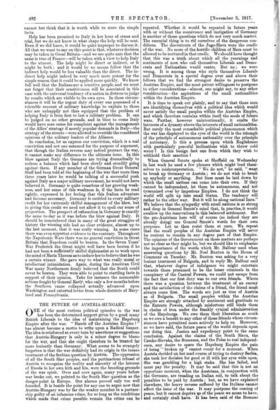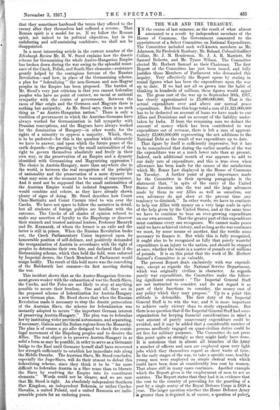THE FUTURE OF AUSTRIA-HUNGARY.
ONE of the most curious political episodes in the war has been the determined support given by a good many British Liberals to the idea of maintaining the Hapsburg Empire after the war. " Hands off the Austrian Empire I " has almost become a motto to write upon a Radical banner. The idea is reinforced at every turn by assertions or suggestions that Austria-Hungary is only in a minor degree to blame for the war, and that she ought therefore to be treated far inure leniently than Germany. What seems to be strangely forgotten is that the war definitely had its origin in the insane treatment of the Serbian question by Austria. The oppression of all the South Slav peoples, and the pertinacious refusal of Austria to recognize the reality and sincerity of the interest of Russia in her own kith and kin, were the breeding-grounds of the war spirit. Over and over again, many years before war broke out, we pointed to the South Slav question as the danger-point in Europe. Our alarms proved only too well founded. It is beside the point for any one to argue now that Austria-Hungary was by far the weaker member in a partner- ship guilty of an infamous crime, for so long as the conditions which made that crime possible remain the crime can be
repeated. Whether it would be repeated in future years with or without the connivance and instigation of Germany is another of those questions which do not very much matter. The essential thing is to rid ourselves of the dangerous con- ditions. The discontents of the Jugo-Slays were the cradle of the war. No more of the horrific children of Mars must be allowed to be nurtured in that cradle. We should have thought that this was a truth about which all the yearnings and sentiments of men who call themselves Liberals and Demo- crats and Nationalists would centre. But no ; we were wrong. It is among those who style themselves Liberals and Democrats in a special degree over and above their fellows that we find the strongest desire to preserve the Austrian Empire, and the most patent willingness to postpone to other considerations—almost, one might say, to any other consideration—the aspirations of the small nationalities within the Austrian Empire.
It is time to speak out plainly, and to say that these men are identifying themselves with a political idea which would never satisfy the small peoples within the Austrian Empire, and which therefore contains within itself the seeds of future wars. Further, however unintentionally, it exalts the interests of a dynasty above the interests of small nationalities. But surely the most remarkable political phenomenon which the war has displayed to the eyes of the world is the triumph of the principle of autonomous nationality over the principle of autocracy. Is this a process upon which Englishmen withparticularly peaceful inclinations wish to throw cold water ? Is this benign fact one from which they wish to withhold their sanction I When General Smuts spoke at Sheffield on Wednesday in last week he used a few phrases which might lend them- selves to misinterpretation. " We do not," he said, " want to break up Germany or Austria ; we do not wish to break up anybody or anything. But lines must be laid down by which the small nations can come into their own. If they cannot be independent, let them be autonomous, and not tyrannized over by imperious Empires. I do not think the world will split up into small States. The tendency will rather be the other way. But it will be along national lines." We believe that the sympathy with small nations is so strong and deep in General Smuts's mind that, in practice, it would swallow up the reservations in this balanced settlement. But the pro-Austrians here will of course (as indeed they are already doing) use General Smuts's words for their own purposes. Let us then resist them at once. We repeat that the small -peoples of the Austrian Empire will never be content to remain in any degree part of that Empire. The opinions of the Government on these matters are perhaps not as clear as they might be, but we should like to emphasize the importance of the words which Mr. Balfour used when answering questions by Mr. Noel Buxton in the House of Commons on Tuesday. Mr. Buxton was asking for a very lenient treatment of Bulgaria, and in reply Mr. Balfour said that, whatever degree of indulgence we might entertain towards those presumed to be the lesser criminals in the conspiracy of the Central Powers, we could not escape from the fact that our first duty was to our own friends. Where there was a question between the treatment of an enemy and the satisfaction of the claims of a friend, the friend must always come first. The words are just as true of Austria as of Bulgaria. The small peoples within the Austrian Empire are strongly attached by sentiment and gratitude to the Entente Powers, although misfortune still binds them in chains of iron under the frankly cynical administration of the Hapsburgs. We owe them their liberation as much as we owe a benefit to any other of those friends whom circum- stances have permitted more actively to help us. Moreover, as we have said, the future peace of the world depends upon our doing this. Justice and expediency point to the same conclusion. Against the claims of the South Slays, the Czeoho-Slovaks, the Rumanes, and the Poles to real independ- ence, any desire to spare the Hapsburg Empire the pain of being broken up' cannot count for a moment. When Austria decided on her mad course of trying to destroy Serbia, she took her decision for good or ill with her eyes wide open. She was gambling for a high stake. She has failed, and must pay the penalty. It may be said that this is not an opportune moment, when the Austrians, in conjunction with the Germans, are treading on Italian soil, to talk about the penalties to be paid by Austria ; but, as we have explained elsewhere, the heavy reverse suffered by the Italians cannot affect the issue of the war. It may postpone the coming of peace, but it cannot deprive la of the peace we mean to have, and certainly shall have. It has been said of the Romans
that they sometimes hardened the terms they offered to the enemy after they themselves had suffered a reverse. That Roman spirit is a model for us. If we follow the Roman spirit, not indeed to its political objectives, but in its unfaltering and self-sustaining confidence, we shall not be disappointed. In a most interesting article in the current number of the Edinburgh Review Mr. H. IV. Steed explains how the drastic scheme for Germanizing the whole Austro-Hungarian Empire has broken down during the war owing to the splendid resist- ance of the Czech, Polish, and South Slav elements—resistance greatly helped by the contagious fervour of the Russian Revolution—and how, in place of the Germanizing scheme, a plan for " federalizing " the non-German and non-Magyar peoples in the Empire has been proposed. The burden of Mr. Steed's very just criticism is that you cannot federalize peoples who have no point of contact, no racial or national sympathy with the centre of government. Between the races of Slav origin and the Germans and Magyars there is nothing but antipathy. As Mr. Steed says, there is no such thing as " an Austro-Hungarian nation." There is only a tradition of government in which the Austrian-Germans have always worked for Germanization in full sympathy with Prussian conceptions, and the Magyars have always worked for the domination of Hungary—in other words, for the rights of a minority to oppress a majority. Which, then, is to be preferred—for this is the question which ultimately we have to answer, and upon which the future peace of the earth depends—the granting to the small nationalities of the right to govern themselves absolutely and freely in their own way, or the preservation of an Empire and a dynasty identified with Germanizing and Magyarizing oppression ? The choice in Austria-Hungary, more than anywhere else in the world, is between the real recognition of the principle of nationality and the preservation of a mere dynasty for what may seem at the moment to be reasons of convenience. And it need not be supposed that the small nationalities of the Austrian Empire would be isolated fragments. They would combine and cohere, as they have already shown plenty of signs of doing. Mr. Steed describes how Count Clam-Martinitz and Count Czernin tried to win over the Czechs. We have not space to follow the narrative in detail, but all students of foreign politics are familiar with the outcome. The Czechs of all shades of opinion refused to make any assertion of loyalty to the Hapsburgs or disavow their staunch and trusted national leaders, Professor Masaryk and Dr. Kramarzh, of whom the former is an exile and the latter is still In prison. When the Russian Revolution broke out, the Czech Parliamentary Union improved upon its honourable position of self-defence, and positively demanded the reorganization of Austria in accordance with the right of peoples to determine their own fate, and declared that if the Germanizing scheme, which then held the field, were enforced by Imperial decree, the Czech Members of Parliament would resign bodily. The result of this bold move was the convoking of the Reichsrath last summer—its first meeting during the war.
This incident shows that as the Austro-Hungarian Govern- ment grows weaker with the exhaustion of war the South Slays, the Czechs, and the Poles are not likely to stop at anything possible to secure their freedom. One and all, they see in the proposed scheme of federalization for Austria-Hungary a new German plan. Mr. Steed shows that when the Russian Revolution made it necessary to stop the drastic persecution of the Austrian Slays, the scheme for federalization was instantly adopted to secure " the important German interest of preserving Austria-Hungary." The plan was to federalize her by instituting wider provincial autonomies, and separating, if necessary, Galicia and the Italian regions from the Monarchy. The plan is of course a pis alley designed to check the centri- fugal movement of the Hapsburg peoples and to deceive the Allies. The real object is to preserve Austria-Hungary in as solid a form as may be possible, in order to serve as a Germanic bridge to the East until Germany herself shall have recovered her strength sufficiently to establish her immediate rule along the Middle Danube. The Austrian Slays, Mr. Steed concludes, especially the Jugo-Slays, will do their utmost to defeat this federalizing scheme, since they think it to be " far more difficult to federalize Austria in a Slav sense than to liberate the Slays by resolving the Empire into its constituent elements." Words could not be clearer, and we are sure that Mr. Steed is right. An absolutely independent Southern Slav Kingdom, an independent Bohemia, or rather Czecho- Slovakia, a united Poland, and a united Rumania are indis- pensable points for an enduring peace.















































 Previous page
Previous page